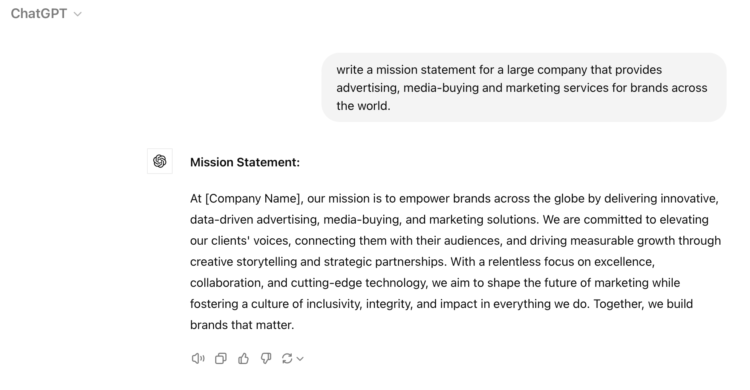Who cares about advertising? Those who are willing to say ‘no’
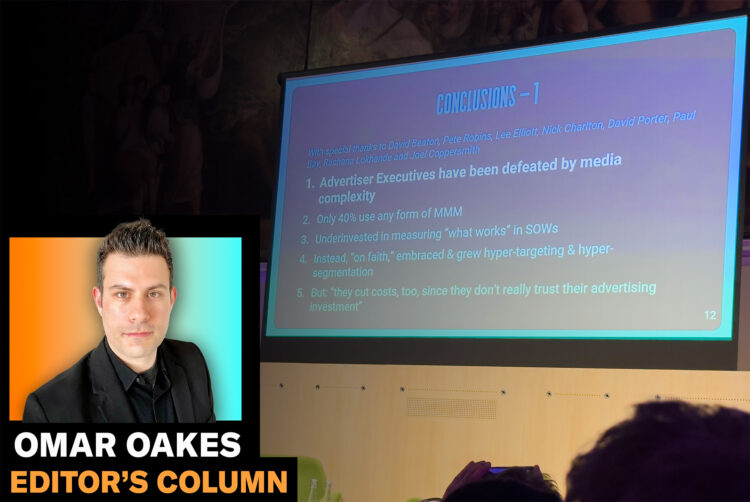
Opinion: 100% Media 0% Nonsense
This sector has the talent and the tools to succeed. But whether it has the stomach to start challenging bad practice is key to arresting its decline.
Agencies love to say “yes”.
“Yes, we can do more work with fewer people.”
“Yes, I’ll have this work ready for Monday morning even though you’ve just told me about it on Friday afternoon.”
“Yes, we’ll pitch for this account by preparing over the Christmas holiday.”
This kind of attitude in business, where a service provider has such an enthusiastic “can-do” attitude, is a particularly pernicious cancer that is rife in the modern economy, let alone advertising and media.
It burns people out by creating stress and unsustainable workloads, while eating away at a company’s long-term profitability.
Have the courage to make decisions
It comes down to this: is an “agent” (literally, an agency employee) a servant or a consultant?
A servant will always say “yes” because that’s the nature of servitude: their job is enable a customer to access some product or service in the most pleasurable way, even if it’s not in their best interest. Hence a retail shop assistant or a waiter being given the childish maxim: “The customer is always right.”
Of course the customer is usually wrong. They don’t know about your product or service better than you do. But you don’t eat at a restaurant to be “right” — you go there to feel good about how you’ve been treated. You are there to be patronised.
Buying millions of pounds’ worth of technical services should not be the same as having dinner at a restaurant. Great business relationships depend on truth, decisiveness and consultative communication.
A consultant is prepared to say “no” because they are being paid to give you the best advice possible, even if it’s uncomfortable to deliver. It should be based on logic and experience, and be — to borrow one of the best ad slogans of all time — “reassuringly expensive”.
The power of the word “no” struck me during last week’s Who Cares? conference, organised by industry veterans Nick Manning and Brian Jacobs (both of whom, I’m proud to say, have written many insightful pieces for The Media Leader over the years).
The event attracted many familiar faces and, judging from the conversations I’ve had with many of them since, really do care about the health of this industry. Simon Redican provides a thoughtful summary.
Manning and Jacobs wanted to start a meaningful dialogue about how to fix advertising’s well-known problems that never seem to go away: relentless ad fraud; a miasma of dull, ineffective ads; and billions wasted through poor media choices.
Inspiringly, they were able to attract some of the industry’s most successful practitioners to lead working groups that would suggest a range of fixes. Videos from the event are being made available to watch this week and they are well worth your time.
What is the strategy?
One that everyone should watch is that of consultant and author Michael Farmer (see here and here for interviews about his work).
Farmer, author of Madison Avenue Manslaughter, is known for railing against the broken business model that underpins the modern advertising industry: the fact it is “paid on a man-hours basis”.
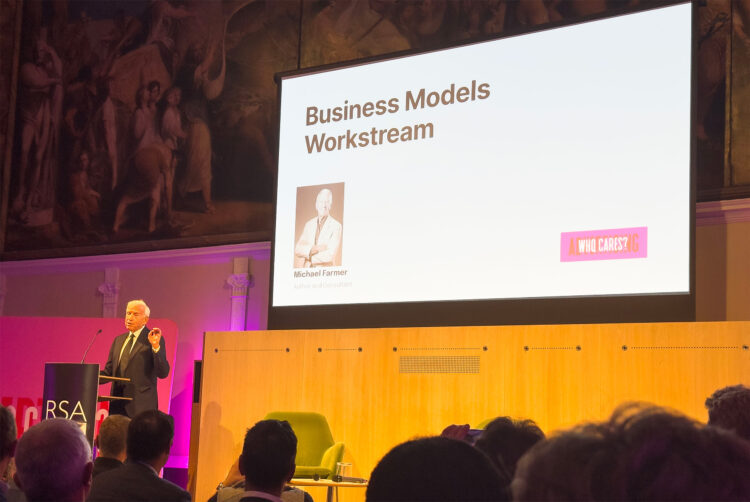
Farmer (pictured above) reminded the audience that large agencies, part of holding groups like WPP, Omnicom, Publicis Groupe and Interpublic, are also at the mercy of share price obsessiveness.
Like a “say yes” culture, public company structures create warped incentives for management. CEOs are not incentivised to make these companies sustainably strong by developing a winning corporate strategy. Their job is to grow the share price, meaning growing revenue and profitability from one quarter to the next.
Don’t believe me? Go to all four holding companies’ websites and look up the stated “strategy” in their annual reports. What, if anything, differentiates one from the next? I’ll wait.
Or read the below and see if you can tell me which company it represents:
“Our mission is to empower brands across the globe by delivering innovative, data-driven advertising, media buying and marketing solutions. We are committed to elevating our clients’ voices, connecting them with their audiences and driving measurable growth through creative storytelling and strategic partnerships.
“With a relentless focus on excellence, collaboration and cutting-edge technology, we aim to shape the future of marketing while fostering a culture of inclusivity, integrity and impact in everything we do. Together, we build brands that matter.”
* Answer at the bottom of this article
Hard numbers
The question you should be asking by now is: why do advertisers put up with this?
As Farmer explained, chief marketing officers and others who employ agencies are just as culpable, because they have come to expect servitude instead of challenge.
The numbers Farmer reported paint a precarious picture.
Since the financial crash in 2008, media spend has doubled — that’s about 5% a year (because of compounding), which is a big, sustained increase relative to how much advertisers have grown.
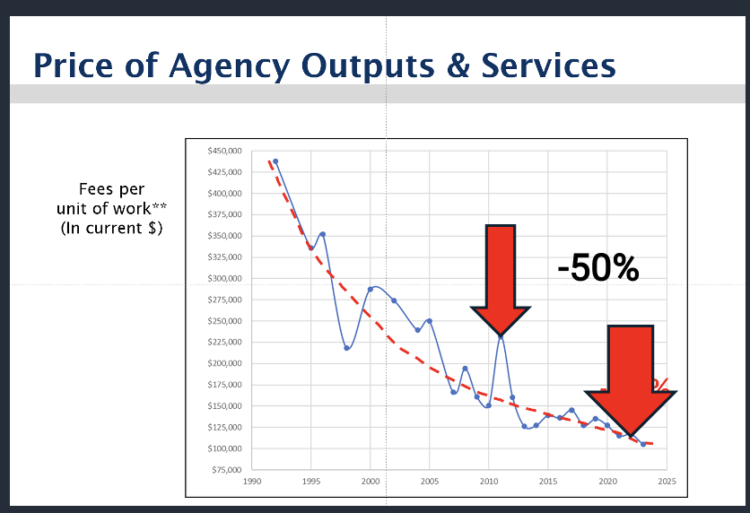
Not only are advertisers spending more on media relative to growth, they are also getting a lot more creative work out of agencies.
Creative deliverables have trebled, but the number of creative full-time employees they pay for has gone up by nearly a fifth (17%). Meanwhile, fees to agencies are being driven down, with procurement specialists being employed by large companies to negotiate contracts.
That means there are fewer people producing more work.
In reality, this means less experienced and junior people are cranking out more work.
Farmer told the conference: “We have an ecosystem of very junior creatives that were, in many cases, born after the great creative work in the industry was done and have only known the industry from its digital and social origins, beginning in around 2005.
“So they don’t have the tradition, they don’t understand the history, they never worked in the environment. There are fewer of them relative to the workload and they’re struggling to get things done.”
This has led to a state of affairs in which 21 of the world’s top 50 advertisers didn’t grow any revenue in the last 15 years (although their share prices have grown by 6.4% per year due to share buybacks, dividend increases and changes in their capital structure).
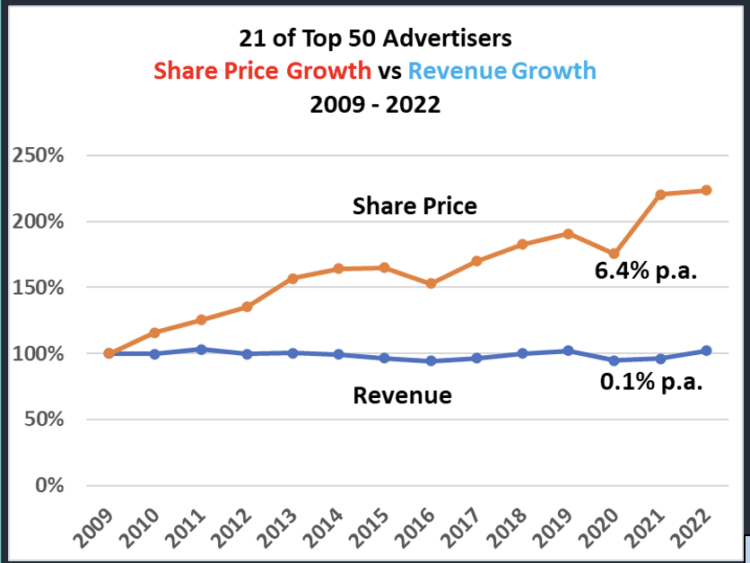
So you have a world in which more money is spent on advertising, but sales are not growing, revenue is not growing and agencies are producing more for less.
By email, Farmer followed up his presentation with the following recommendations on how agencies should deal with marketers:
- Offer them partnerships rather than subservience.
- Commit to a mission to “focus on helping them to grow their brands again”. It will take special efforts to improve and focus the scopes of works (SOWs).
- Become thoroughly familiar with the history of brand performance and develop a POV about what kinds of marketing communications will help brands grow again.
- Develop alternative SOWs to those prepared by clients. Negotiate the differences.
- Use a system (like my ScopeTrack/ScopeMetrics system) to quantify the amount of work in a given SOW and charge for the work, rather than for a guess at man-hours. This is especially urgent, given the likely arrival of man-hour-stealing AI.
- Make recommendations to improve the briefing process to eliminate excess rework.
We have all the ingredients to succeed
The good news is that people clearly do care. Including Sir John Hegarty, who ended the conference with a rousing talk.
You can see the industry cares because look at the interest: people are giving up their time to find solutions and have uncomfortable conversations. On several occasions, The Media Leader has hosted similar discussions in closed-door sessions at our events.
This industry has the information: in addition to Farmer’s analysis, look at the data we have today that we didn’t have a decade ago. For example, results from the All In census about talent shortages, the inequities laid bare in the Black Pound Survey or sustainability warnings contained in the Ad Net Zero report.
And there are the tools to upskill: we have just launched an initiative with the Advertising Association to host all the best training and development resources in one place.
The reason why creative directors of the past are held in high regard is because they were able to offer brands a winning idea based on their knowledge, experience and instinct as a business thinker. Not because they were a nice chap who would bend over backwards for the client.
In other words, they were much more like a consultant than a servant. They said “no”.

Omar Oakes is UK editor-in-chief of The Media Leader. 100% Media 0% Nonsense is a weekly column about the state of media and advertising
The views in this article are expressed by the UK editor-in-chief for publication in The Media Leader UK and do not reflect the views of Adwanted Group
* Answer: it’s actually a trick question (sorry!) — this is the answer ChatGPT gave when I asked it to write a mission statement for a large company that provides advertising, media buying and marketing services for brands across the world.
